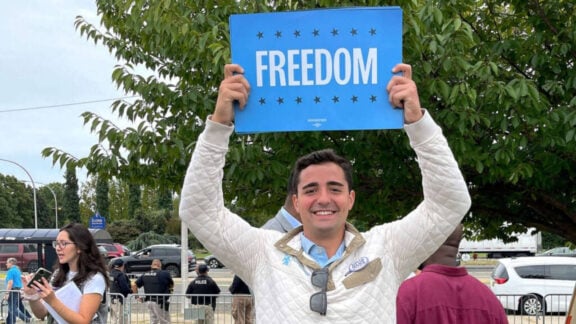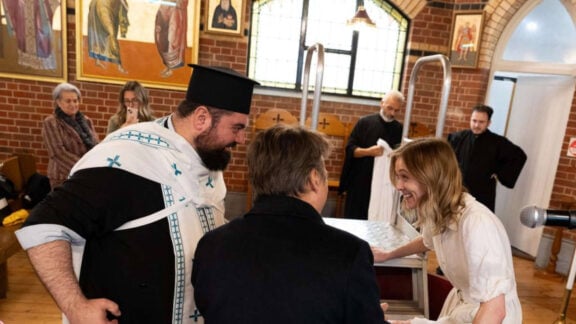It was while sitting around the dinner table with friends in Athens a few years back that the concept for Panayiotis Yannitsos’ documentary Freedom Besieged was inspired. Youths in their early 20s discussing the economic and political instability which has plagued the country for over a decade now, and the impact on their lives – their response one of helplessness and complacency.
“The idea that no matter what their perspective, it would never, could never, lead to real change in the country. They spoke up in 2010, no-one listened, and things only became worse. So why speak up at all? These were promising, intelligent, and compassionate young Greeks who were speaking this way. It troubled me and so I set out to find the truth,” Yannitsos told Neos Kosmos.
Those who were 20 years old when the crisis first reared its head are now 30. Just let that process for a moment; a time that most would argue is the most pivotal period in one’s adulthood, when the foundations are well and truly placed to take the next steps in life, has been tarnished by lack of opportunity and widespread unemployment.
With this in mind, Canadian-born Yannitsos set the wheels in motion for his documentary in August 2016 and has just recently wrapped up production.
Among those interviewed were intellectuals such as Noam Chomsky, politicians such as former US presidential nominee Michael Dukakis, and current New Democracy Party Leader Kyriakos Mitsotakis. Also taking part were national heroes like four-time Olympic medallist Pyrros Dimas, and football legend Giorgos Karagounis.
“On the eve of the NATO summit, we travelled to Brussels to interview the Chief Spokesperson of the European Commission Margaritis Schinas. But what is most groundbreaking to me, is the fact that we have paired some of the biggest names in the intellectual, political, and international community with the 29-year-old Uber driver in central Athens, the 22-year-old photographer working in the anarchist neighbourhood of Exarcheia, the 30-year-old entrepreneur who stayed when everyone around her left,” Yannitsos shares.
He says that the general sentiment amongst those he spoke to was one of defiance, with young Greeks working harder today than they ever have, and with the crisis having been such a significant focus for so long, he says it is often the case that many are sick of talking about it.
“They don’t like to play the victim card and that even caused problems for us trying to get interviews,” Yannitsos admits.
“Sure, there are moments where they sit behind closed doors, running their hands through their hair, wondering if they can keep up this pace for another month. But they do. They keep coming to work despite it all. Imagine such resilience given a sliver of the appropriate support. I hope that this film can help in some way,” he adds.

When the 25-year-old first started the project he says the title, Freedom Besieged, seemed only fitting, given that that is exactly what he thought he would find. And while he says that there were elements of that present, he also found light within the darkness leading him to question the suitability of the title.
“I discovered a young generation of Greeks who are on their feet, innovating, engaging, and creating amazing things. These are not victims. It has pushed me to think about changing the title of the film. Perhaps we get rid of that ‘Besieged’ word, because young Greeks won’t allow for it anymore. Many have pried their freedom back from the death grip of the crisis,” Yannitsos says.
But this optimism isn’t without its frustrations. When it comes to youth and fulfilling the potential which is ever present in Greece, the filmmaker says that the assistance needed to move forward and put to use needs to be recognised by those in high places, before the already prominent brain drain, which has seen thousands of educated and talented Greeks move abroad in search of the support their own country has not be able to afford them, continues.
“The young Greeks that I have met are exceptionally hard working, motivated, and masters of their domain. They are educated. They are humble. But you have to meet them halfway. Fertile soil isn’t enough. You must provide light, water, something,” he explains.
“For goodness sakes, can we get some programs for our young entrepreneurs, tax incentives, anything? We can’t afford to lose another generation. Not one this talented. So it’s time for those who govern to do just that and wake up to this opportunity.”

The project until now has been largely self-financed with the help of a small handful of individual donations. Now at a standstill until the necessary funds are raised for the all-important editing process, Yannitsos is looking to his fellow Greeks in the diaspora for assistance.
“We are open to organisations and individuals who may wish to donate to this important film.”
When asked what he hopes the documentary will contribute to the conversation about the crisis, he says the key lies in the word ‘conversation’, and by giving insight into its effects on the youth to provide young Greeks with a voice on the global stage.
“This film carries a hope-based theme and dives into the stories of some of the most compassionate, hard-working, and selfless Greeks, young and old, combating the crisis valiantly on a daily basis,” he says.
“It is a road we often forget to travel, the one paved with optimism and innovation, when we talk about the consequences of the crisis. The story of an elderly gentleman weeping outside a Greek bank goes viral but we forget the eco-village being built by young Greeks three hours away. Most importantly, you mentioned the word ‘conversation’. That, above all else.”
To contribute to see the project realised, you can reach out to the team by email at info@insideearth.productions
Donations can be made by PayPal, wire transfer, or a cheque written to ‘Inside Earth Productions Inc.’









